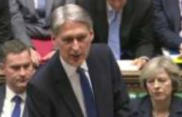
The Financial Group
We simplify all those essential financial decisions



IN THE NEWS November 2016
Chancellor
Philip
Hammond
delivered
his
first,
&
last,
Autumn
Statement
on
Wednesday
23rd
November
&
here
we
provide
a
summary of the key points that will affect your personal finances.
New Budget dates
o
This
was
the
last
Autumn
Statement.
After
the
next
Budget
in
spring
2017,
we’ll
be
switching
to
a
2017
Autumn
Budget
followed
by
a
2018
Spring
Statement,
with
the
pattern
then
repeating each subsequent autumn and spring.
o
This
will
give
welcome
breathing
space
between
the
announcement
of
budget
changes
and
their
introduction,
and
equally
give
us
time
to
prepare
&
advise
you
of
any
imminent
changes
before thay are introduced.
Tax
Income tax
o
Personal allowance will increase to £11,500 in 2017/18.
o
Higher rate tax threshold will rise to £45,000 in 2017/18.
o
Income
tax
rates.
0%
starting
rate
on
savings
income
up
to
£5,000,
and
additional
rate
threshold all remain unchanged for 2017/18.
o
The
government
remains
committed
to
delivering
a
personal
allowance
of
£12,500
and
higher
rate tax threshold of £50,000 by the end of the current parliament.
Salary exchange
o
Following
consultation
(back
in
August
2016),
the
tax
and
employer
NI
advantages
of
salary
sacrifice
schemes
will
be
removed
from
April
2017,
except
for
arrangements
relating
to
pensions (including advice), childcare, Cycle to Work and ultra-low emission cars.
o
This
will
mean
that
employees
exchanging
salary
for
benefits
will
pay
the
same
tax
as
the
vast
majority of individuals who buy them out of their post-tax income.
o
Arrangements
in
place
before
April
2017
will
be
protected
until
April
2018;
and
arrangements
for cars, accommodation and school fees will be protected until April 2021.
Insurance Premium Tax (IPT)
o
This
will
increase
from
10%
to
12%
from
1
June
2017.
IPT
is
a
tax
on
insurers
and
it
is
up
to
them whether and how to pass on costs to customers.
Inheritance Tax
o
The current nil rate band of £325,000 will remain frozen at this level until April 2021.
o
From
April
2017
an
additional
nil
rate
band
will
apply
where
a
residence
is
passed
on
death
to
a
direct
descendant.
The
residence
nil
rate
band
will
also
be
available
when
a
person
downsizes
or
ceases
to
own
a
home
on
or
after
8
July
2015
where
assets
are
passed
on
death
to direct descendants.
Corporation Tax
o
The
current
rate
of
corporation
tax
is
20%.
The
chancellor
also
confirmed
his
commitment
in
the Autumn Statement to reduce the rate to 17% by 2020.
Capital Gains Tax (CGT)
o
There
was
no
mention
of
any
change
to
either
the
rates
of
CGT
or
the
annual
exempt
amount.
We expect any uplift in the annual exempt amount to be announced in spring 2017.
Pensions
Money Purchase Annual Allowance (MPAA)
o
The plan is to reduce this to £4,000 from April 2017.
o
By
way
of
background,
once
a
person
has
accessed
pension
savings
flexibly,
if
they
wish
to
make
any
further
contributions
to
a
defined
contribution
(DC)
pension,
tax-relieved
contributions are restricted to a special MPAA.
o
A
consultation
has
been
published
alongside
the
Autumn
Statement
seeking
views
on
the
proposal
to
reduce
it
to
£4,000.
(Note
that
just
taking
a
tax
free
cash
sum
doesn’t
trigger
the
MPAA.)
.
Pension scams
o
A
consultation
on
the
options
for
tackling
pension
scams
including
pensions
cold
calling
will
shortly
be
published.
It
is
hoped
this
will
give
firms
increased
powers
to
stop
suspicious
transfers and abuse of small self-administered schemes.
Triple Lock
o
The
State
Pension
is
protected
by
a
triple
lock,
which
means
that
it
increases
each
year
in
line
by the higher of inflation, the increase in average earnings or 2.5%.
o
In
his
speech
the
Chancellor
confirmed
the
pledge
to
keep
the
triple
lock
to
the
end
of
the
current Parliament, but also announced the policy would be reviewed in the next Parliament.
Foreign pensions
o
The
tax
treatment
of
foreign
pensions
will
be
more
closely
aligned
with
UK
pension
tax
rules
for
UK
residents.
Foreign
pensions
and
lump
sums
will
be
taxed
in
the
same
way
as
UK
pension
schemes
for
anyone
returning
to
the
UK.
The
government
will
also
close
specialist
pension schemes for those employed abroad to new savings.
ISAs
o
The
2017/18
annual
subscription
limit
for
ISAs
will
rise
to
£20,000
as
announced
in
the
2016
Budget
o
Junior
ISAs
and
Child
Trust
Funds
annual
subscription
limits
will
see
a
CPI
linked
rise
to
£4,128
in 2017/18.
National Insurance
o
The
National
Insurance
secondary
(employer)
threshold
and
the
National
Insurance
primary
(employee)
threshold
will
be
aligned
from
April
2017,
meaning
that
both
employees
and
employers
will
start
paying
National
Insurance
on
weekly
earnings
above
£157.
This
should
simplify the payment of National Insurance for employers.
o
The upper earnings limit will increase from £827 per week to £866 per week
o
As
announced
at
the
2016
Budget,
Class
2
NICs
will
be
abolished
from
April
2018,
simplifying
National
Insurance
for
the
self-employed.
The
Autumn
Statement
confirms
that,
following
the
abolition
of
Class
2
NICs,
self-employed
contributory
benefit
entitlement
will
be
accessed
through Class 3 and Class 4 NICs.
Savings
NS&I Investment Bond
o
A
new
3
year
savings
bond
to
be
launched
to
help
savers
who
have
struggled
with
low
interest
rates.
o
The
indicative
rate
is
2.2%
but
this
is
subject
to
change.
Savers
aged
16+
will
be
able
to
invest
between
£100
and
£3,000
and
the
bond
will
be
available
for
12
months
from
Spring
2017.
Miscellaneous
National Living Wage
o
This
is
to
rise
4.2%
from
£7.20
to
£7.50
per
hour,
which
is
a
pre-tax
increase
of
£10.50
per
week for someone working a 35 hour week.
A ban on Letting Agent fees for tenants
o
This
is
intended
to
improve
competition
in
the
rental
market
and
make
fees
for
renters
more
transparent.
o
There
will
be
a
consultation
on
this
from
the
Department
for
Communities
and
Local
Government (DCLG) before it is written into legislation.
Tampon tax
o
£3 million will be awarded from the controversial Tampon Tax.
o
This
will
be
passed
to
Comic
Relief
to
distribute
between
a
range
of
womens’
charities,
including those that tackle violence against women and girls.
As always, if any of the above prompts any questions, or you need any help, please do not hesitate to
contact us
.
The
information
provided
is
based
on
our
current
understanding
of
the
2016
Autumn
Statement
and
associated
documents
and
may be subject to alteration as a result of changes in legislation or practice.



- In the News
- The Housing Market
- The Education Section
- Income Drawdown
- ISAs
- Lisa & Help to Buy ISA
- Risk v Return
- Stamp Duty Land Tax
- Archive
- Oct 2011 State Pensions
- Nov 2011 Structured Products
- Dec 2011 Pound Cost Averaging
- Jan 2012 Trusts
- Feb 2012 ASU
- Mar 2012
- Apr 2012 House Surveys
- May 2012 Options at retirement
- Jun 2012 IHT
- July 2012 FSCS
- Aug 21012 Index
- Sep 2012 EU Gender Directive & I minus E
- Oct 2012 Interest Only mortgages
- Nov 2012 NEST
- Feb 2013 APR
- Apr 2013
- May 2013 Investing in Funds pt1
- June 2013 Investing in Funds pt2
- July 2014 New ISAs









